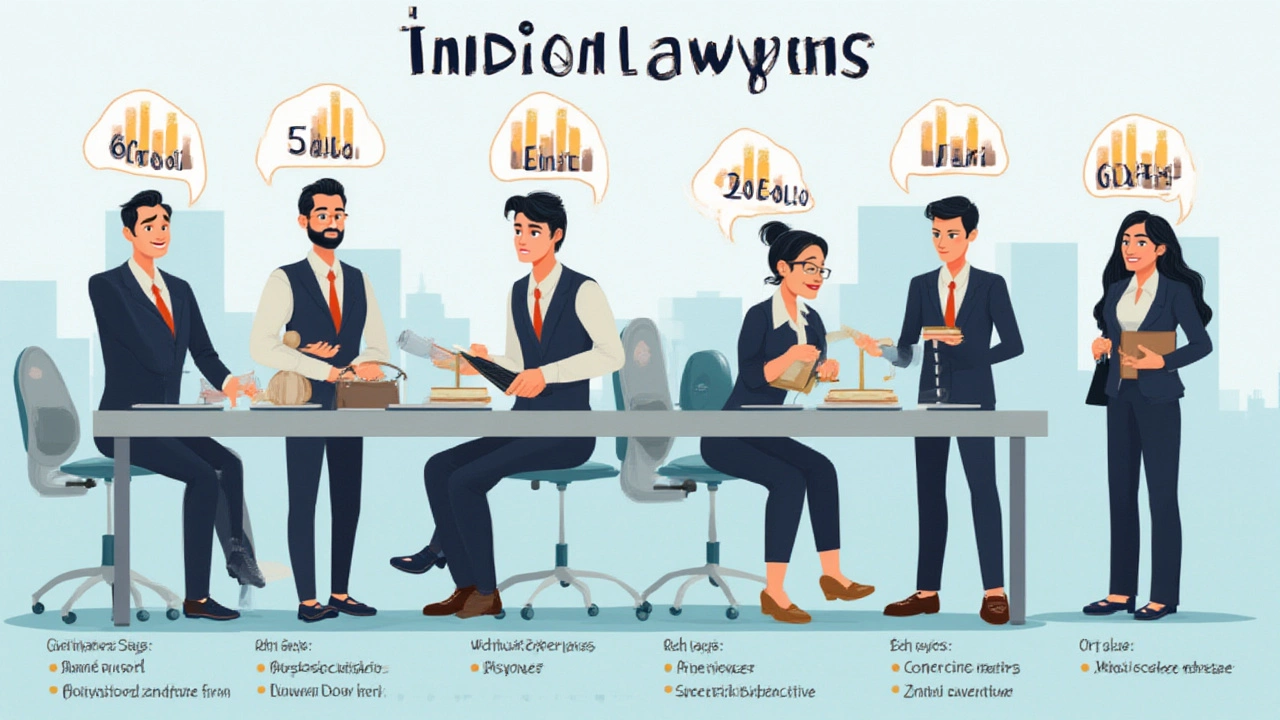Money talks, and in law, it shouts. Forget the stereotypical TV-lawyer rolling up in a luxury car—that image, while possible, only tells half the story. What’s the real deal with lawyer pay in 2025? Why do some attorneys make barely above a teacher’s wage, while others pocket more in a month than many see in a year? Here’s the gritty, honest truth about legal paychecks—no sugar coating, just actual numbers, jaw-dropping facts, and practical wisdom from offices, courtrooms, and even the breakrooms where the real talk happens.
The Money Spectrum: How Lawyer Pay Really Works
Let’s put one myth to bed: law school does not automatically turn you into a millionaire. The "average" lawyer pay in the United States can be wildly misleading because of the huge gap in earnings between different types of legal work, employers, and locations. According to data released by the U.S. Bureau of Labor Statistics (BLS) at the end of 2024, the median annual wage for lawyers sits around $138,000, but that number hides more than it reveals.
Take the top law firms: The so-called “BigLaw” circle—think Latham & Watkins, Kirkland & Ellis, or Skadden—are famous for their eye-popping pay. First-year associates in these firms are being offered base salaries of $225,000 in 2025. And yes, that’s straight out of law school, often not including hefty bonuses for those who really perform. Bonuses at BigLaw can climb above $100,000, especially for those who bill insane hours or work in hot practice areas like M&A or tech litigation.
But most lawyers never set foot in these elite hallways. Over half of U.S. attorneys work in small firms or run solo practices. In those scenes, starting pay sometimes barely cracks $60,000—and that can feel like a lot for some rural or small-town firms. Public interest lawyers, including those in legal aid or non-profits, often accept jobs for $50,000 or even less, even in expensive cities. Some public defenders and prosecutors in smaller regions struggle past $42,000 their first year. Not exactly the lifestyle you imagined from Suits or The Good Wife, right?
How about the super-earners? Partners at the largest firms routinely clear seven figures—think $1 million, $2 million, and sometimes up to $5 million or more a year, depending on their rainmaking abilities. In contrast, high-stakes trial lawyers with winning records have reported settlements that paid them $10 million in contingency fees—for just one case. Of course, these are the exceptions, not the rule, and luck always plays a part.
Geography plays a huge role too. New York and San Francisco lawyers, for example, command the highest pay, but those crazy salaries often get swallowed by eyewatering rent and living costs. In booming cities like Austin or Denver, pay is rising fast, but it’s still catching up with the coastal heavyweights. Meanwhile, in smaller towns or the Midwest, cost of living is easier but top salaries rarely show up. Some lawyers even find higher life satisfaction chugging away in a smaller market, trading lower pay for saner hours and time with family.
If you’re eying the in-house path (working directly for companies), pay varies wildly. Fortune 500 general counsels? They might earn $700,000 to millions with salary, bonuses, and stock. But most corporate counsels sit somewhere between $140,000 and $240,000, depending on experience and how close they are to the C-suite. And, of course, fewer hours and less stress sometimes make those jobs a hot ticket—even if they don't come with Hollywood paychecks.
One thing most folks miss: billing targets and bonuses affect real pay. At major firms, associates are expected to claw their way past 2,000 billable hours a year just to keep up. That means late nights, canceled weekends, and the constant pressure of "making your hours"—all for the chance at a big check.
Then there’s the question of specialties. Trial lawyers in personal injury, intellectual property, and tech often rake in bigger checks. Family law and criminal defense tend to pay less, except for the big-name attorneys in urban markets. Employment, real estate, and trust-and-estates lawyers can do very well, but usually after years of slow-building trust and a steady client base. If you’re a wizard at negotiation or land corporate clients, you might find your income climbs fast, but most climb the ladder one rung at a time.
A weird but true fact: A 2023 survey by the National Association for Law Placement (NALP) showed that about a quarter of new law grads were earning less than $70,000, while another chunk hit pay north of $215,000. It’s a job market with huge cliffs—not gentle slopes.

Tips, Tricks, and Facts: How to Maximize Lawyer Pay
No one wants to grind for decades for peanuts. If you want to push your pay as high as possible, you need to play smart. Here’s what really moves the needle in 2025:
- Law school matters, but not always the way you think. Graduates from the top 14 (T14) law schools—Columbia, Harvard, Stanford, and so on—still score more BigLaw offers and higher starting pay on average. But regional schools with strong alumni networks can sometimes catapult grads into top jobs locally. Sometimes it’s who you know, not just where you went.
- Network like it’s a second job. Many lawyers land their highest-paying cases or clients through referrals—not cold applications. Join bar associations, attend conferences, say yes to pro bono work. That one coffee meeting could write your next paycheck.
- Find your niche and own it. IP, patent law, fintech, securities litigation, and data privacy are exploding right now. Specializing isn’t just about getting good at something; it’s about finding the clients who’ll pay top dollar for your expertise.
- Consider alternative fee structures. Contingency, hybrid, flat fees—lawyers who get creative with billing, especially in plaintiff work or high-volume practices, can boost their bottom line way past the hourly wage model. Be transparent with clients, though, or billing disputes can bite you later.
- Work for yourself…eventually. Building your own firm takes guts, risk, and a ton of sweat, but solo practice lets you set prices and keep more of the pie. Many successful lawyers spend years learning the ropes before hanging their own shingle—and some never look back.
- Don’t underestimate tech skills. Lawyers who learn legal project management, e-discovery platforms, or who build a social media presence often rake in more clients. Some have launched TikTok and Instagram accounts giving legal tips and exploded both their public profile and earnings.
- Keeps tabs on debt. Law school loans can easily top $200,000, so salary negotiations should always keep your bottom line in the picture. There are now more income-based repayment options and forgiveness for public service lawyers, but don’t ignore loan realities.
- Keep your stress in check. Some of the highest-paid lawyers also burn out fast. Mental health is a rising concern in the profession. Watch for burnout, and be honest with yourself about whether more money isn’t costing more than it’s worth.
I’ve seen public defenders who hustle side gigs teaching, consult on cases, or freelance write legal articles that pay off. Meanwhile, I also know partners who walked away from seven-figure practices to get their lives back on track. The secret? Be honest about what really matters to you—money, work-life balance, professional satisfaction—and adjust your path as you go.
One rarely-discussed factor: diversity is reshaping the landscape. Firms that are winning diversity awards and broadening their client bases often see better business and, yes, higher profits. If you’re bilingual or understand under-served markets, that’s a real asset. The old boys’ club isn’t the only game anymore, and clients are looking for attorneys who "get" them, beyond billable hours.
The meteoric rise of legal tech in the last three years has also changed things. AI-powered tools handle lots of research and document review now, pushing lawyers to up their game in strategy, negotiation, and courtroom presence. The upside? Clients pay more for the human skills machines can’t offer—empathy, persuasion, tactical creativity.
Here’s a quirky tidbit that’s becoming more common: Some lawyers are negotiating extra perks instead of money—things like remote work options, extra vacation, profit-sharing, or equity. That doesn’t show up in salary stats but can make a job more lucrative and way less stressful in the long run.
Bottom line: If you’re strategic, keep your antenna up for trends, and build real relationships with your clients and peers, you can stack serious earnings—even if you start small.

Future-Proofing Your Legal Career: Beyond Just the Paycheck
Chasing the highest lawyer pay is a solid motivator, but the real winners know the twists and turns matter just as much as the starting line. Right now, the legal industry is shifting underfoot, and smart lawyers are looking beyond base salary to what really makes a long-term, healthy, and profitable career.
Hybrid work has become the norm far faster than anyone expected. As of 2025, about 60% of large law firm associates now work remote at least part-time. That’s changed everything from lifestyle to pay. Firms in less expensive cities are poaching talent from coastal giants by offering solid salaries and the comfort of staying home—or spending that would-be rent on, well, anything but rent. If you value time, flexibility, and sanity, firms with flexible work policies are often competitive on pay—and the value of your time saved on a commute can’t be ignored.
The area of law you choose also shapes your future earnings. Blockchain, cybercrime, and green energy law are growing at breakneck speed as regulations catch up to new technology. Niche legal fields often have fewer experts, giving sharp attorneys more leverage on rates. If you’re willing to pivot and learn, you can ride these waves to top-tier pay.
Networking is still king. The old guard used to work the golf course, but now connections are built at industry meetups, legal podcasts, and even LinkedIn. If you want to be remembered when that mega-client or high-profile case shows up, stay active in the community—online and off. Getting mentorship, referrals, and tips on what’s really happening with pay is all about the network.
Many lawyers get distracted chasing money and miss the satisfaction of helping people. Some of the longest-surviving attorneys balance high earnings with meaningful pro bono work, giving back to their communities, or mentoring up-and-coming lawyers. It’s not charity; it’s a way to stay invested in the work when the bills and the hours get heavy.
AI scares many, but for forward-thinking lawyers, it's a gold mine. Learning to leverage AI for document review, legal research, and case predictions can actually make you more competitive and, yes, justify higher rates to clients expecting fast results. Don’t fear the robots—learn how to work with them, and you’ll future-proof your earnings.
Keep your eye on global trends, too. Some American lawyers are now getting licensed in Canada or the UK through new expedited programs—especially in fields like international arbitration, cryptocurrency regulations, and privacy law. Broadening your skill set and getting dual-qualified can double or triple your client base—without doubling your workload.
Finally, remember that money isn’t everything, but it sure changes your options. If your goal is to hit the top right away, target hot firms, niche practice areas, and cities where demand beats supply. If you want balance, security, and family time, look for in-house roles or build a boutique practice you control. Whatever path you pick, pay is only one measure of success—but armed with real numbers and real strategies, you’ll know exactly what you’re chasing, and why.


